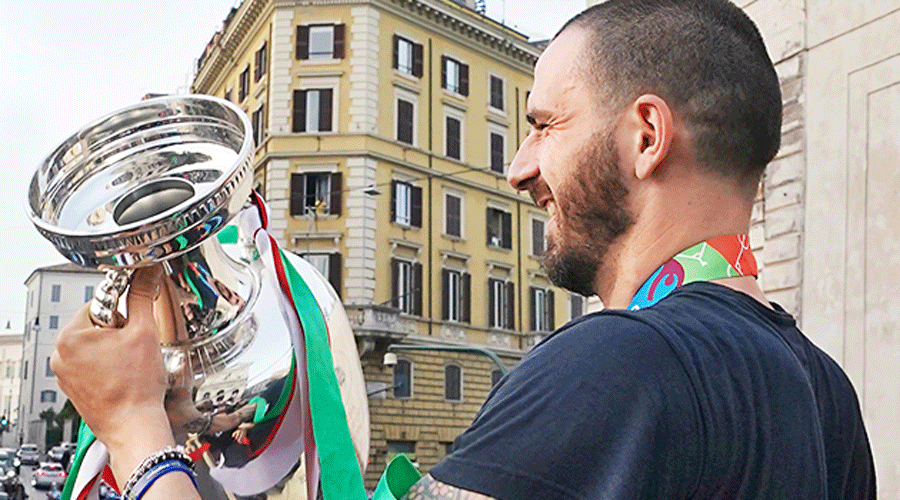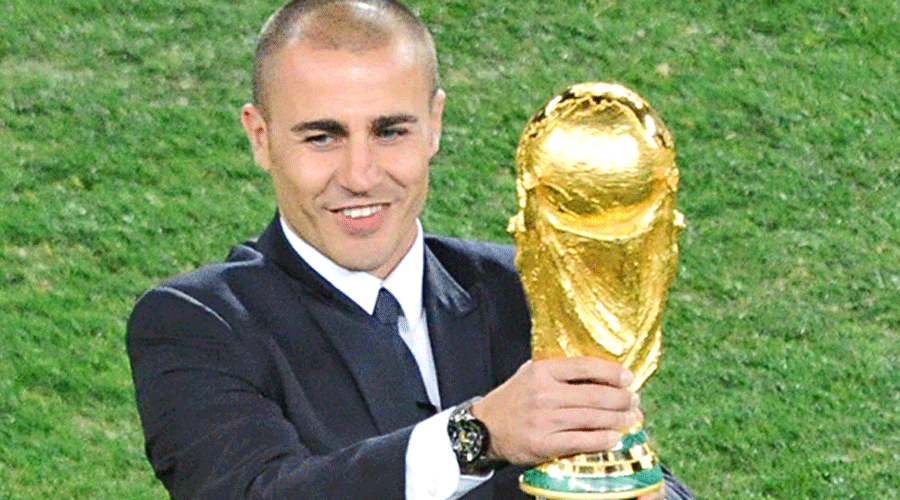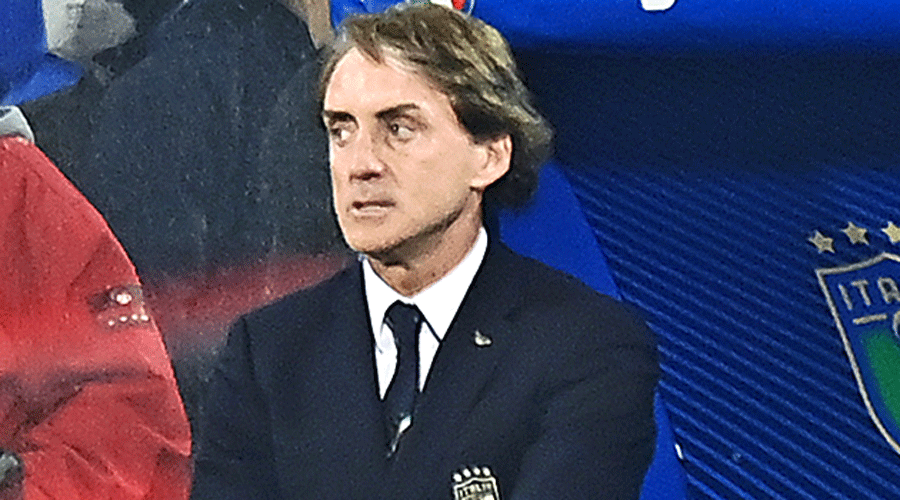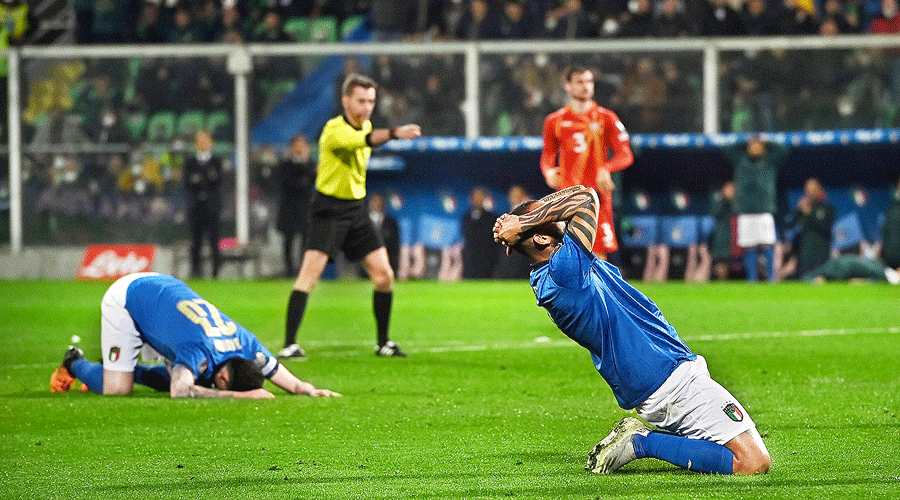Loved and admired around the world for producing players like Roberto Baggio, Paulo Maldini and Andrea Pirlo, Italy’s national team has scant respect at home. The winner of four World Cups, Italy will be absent from the second successive edition of the quadrennial showpiece.
A near-unbreachable defence and the ability to suddenly counterattack get replaced by gross errors at crucial phases. For Italy, that has been their story over the last few years.
Ironically, it was only last year that the Azzurri emerged Euro 2020 champions. Roberto Mancini had taken the Catenaccio (meaning door-bolt, implying a style of football that lays strong emphasis on defence) out of the Italian system as the side stressed more on positive, attacking play en route to their second European Championship crown.

It was only last year that the Leonardo Bonuccis bathed in glory after their Euro 2020 triumph. Getty Images
That offered hope that Italian football was back to dominate, but the Ciro Immobiles and Lorenzo Insignes flattered to deceive thereafter. Triumph in the continental showpiece was followed by the failure to even qualify for the 2022 Fifa World Cup, which gets underway in Qatar on Sunday.
One may say Italy didn’t really deserve to qualify for Russia 2018 as their poor performance dated back to the 2014 World Cup in Brazil in which, they couldn’t progress beyond the group phase. But not being able to qualify for the Cup in Qatar months after winning the Euro was baffling.

Italy last lifted the World Cup in 2006, led by Fabio Cannavaro. Getty Images
Italy missed out on securing a Cup spot after losing by a solitary goal to North Macedonia — a team not quite counted among the strongest — in their playoff semi-final in Palermo eight months ago. But that’s obviously not the sole reason why they didn’t qualify. Why did they have to wait till that playoff semi-final in the first place?
Factors at play
The problem is deep-rooted in Italy. It’s not a matter of just a few results not going their way.
“Italy’s triumph in the European Championship was a combination of exceptional circumstances in their favour,” Pier Paolo Rengucci, a football coach who has been a part of the FIGC (Italian football federation) Coverciano Technical Centre since 1998, told The Telegraph.
“Mancini is without fault. What you need to see is that after the 2009-10 season (when Inter Milan won the Uefa Champions League title), no Italian club has been able to win the Champions League and dominate in Europe.
“Youth sectors of Italian football are full of foreigners. The football clubs are in debt and also full of people who are not qualified enough. Clubs of Serie B and C are not interested in the quality and ability of young players but only in the money that they can earn thanks to them. They only seem to be interested in players who can bring in sponsors.

From Euro glory to failing to qualify for the World Cup, current coach Roberto Mancini has experienced the extremes within a short span. Getty Images
“For this reason, there is a drop in the quality of Italian football. Moreover, Italian coaches are under the control of unscrupulous people,” Rengucci said.
Faulty coaching is another reason behind Italy’s steady decline.
“Another problem here is that even today, football is managed the same way as it used to be 40 years ago.
“There are coaches who haven’t evolved because they are only interested in the result. The pacing of an Italian championship game is also one of the slowest in Europe,” Rengucci argued.
“In addition, Italian clubs are not into serious planning. Besides, there are outdated structures, high ticket prices with matches often boring and stadiums half-empty. Young people have also started to show interest in and play other sports.”
Italian clubs often prefer to keep their prized players away from the national team rather than risk injury. Italy doesn’t even have a home stadium like England does with Wembley. Instead it barnstorms around the country, often playing games in small stadiums and cities — appearing at the San Siro in Milan and the Stadio Olimpico in Rome for only the biggest of matches.
Clubs’ resistance
Serie A refused the Italian soccer federation’s request to amend its calendar and move the league matches from the weekend before the playoffs, which would have allowed coach Mancini more time with his players.
“There is always great resistance from the clubs towards the national team,” federation president Gabriele Gravina said after the March playoff loss to North Macedonia. “The national team is seen more as an annoyance than something that unites an entire country.”
More recently, centre forward Immobile was held back from boarding the team plane to a Nations League game in Hungary amid disagreement about his injury status between the national team and his club, Lazio.
Serie A stars at Cup
Serbia and Poland have each called up 11 players from Serie A to their World Cup squads. And Juventus is sending 11 players to Qatar.
So who will Italian fans support? They’ll root for the players on their club teams.
Juventus suppor ters will cheer Dušan Vlahovic and Filip Kostic with Serbia; Inter Milan fans will follow Romelu Lukaku’s Belgium; and AC Milan “tifosi” will keep an eye on Rafael Leão with Portugal.
In Italy, club teams still call the shots.
With inputs from AP/PTI
Also missing
In spite of the presence of a former Golden Boot winner in the form of James Rodriguez, and reaching the quarter finals and last16 stage in the previous two editions of the Cup, Colombia were one of the favourites to secure a berth in Qatar. But they finished sixth in the Conmebol qualifiers, a point behind Peru who took the playoff spot.
Reaching the last-eight stage four years ago in Russia, Sweden lost three of their six games in the second leg of the qualifiers in 2021. Pitted against Poland in the playoffs after finishing second in their group (behind Spain), the Swedes lost that game 2-0 which crushed their hopes of making the cut for this edition.
The slump in form of the likes of Arturo Vidal, Alexis Sanchez and Gary Medel has been one major reason behind the below-par showing of Chile over the last few years. The favourable results started eluding them after they had finished as pre-quarter finalists in the 2014 World Cup.
In the qualifiers for Qatar 2022, the Chileans won just one of their last four matches, which was one big reason why they couldn’t secure a spot.
One of the most talked about teams in 2018 when they made the quarter finals as hosts, Russia couldn’t find a place in Qatar, or rather, they were expelled from the 2022 Cup. Why? Because of their invasion of Ukraine earlier in February. Fifa announced Russia’s expulsion from all competitions due to the stance of the Vladimir Putin-led government.
Russia had filed an appeal against the ban in the Court of Arbitration of Sport only to withdraw it later.
Since their debut in 1994, Nigeria have featured in all the editions of the World Cup barring Germany 2006. The Super Eagles’ attacking brand of football will be missed this time around as they drew both their playoff-leg clashes against Ghana. The second leg helped Ghana make the cut for Qatar by virtue of an away goal.










